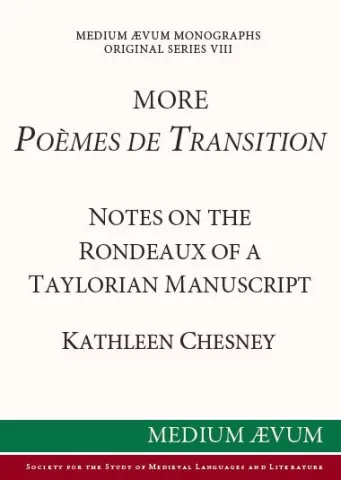RECENTLY there has come to light in the Library of the Taylor Institution at Oxford a French sixteenth-century manuscript containing 328 rondeaux, all anonymous. Many are also found in the important collection (MS. Lille 402) edited by Professor Françon in 1938 as Poèmes de Transition : hence our title. Their metrical pattern shows that they are post Charles d'Orléans, but some are fifteenth century, and examination of contemporary manuscripts reveals the identity of a dozen authors with Clément Marot as the most recent. Seventy-four rondeaux, not found elsewhere, are reproduced in an appendix. This bibliographical study sheds some light on a neglected period of French literature.
More Poèmes de Transition: Notes on the Rondeaux of a Taylorian Manuscript, authored by Kathleen Chesney, provides a critical edition and analysis of a 16th-century manuscript of French rondeaux housed at the Taylor Institution in Oxford. This previously overlooked manuscript contains 330 anonymous rondeaux, primarily centered around themes of love, courtship, and moral reflection. Chesney meticulously examines the manuscript’s structure, provenance, and authorship, identifying several poems attributed to notable poets such as Jean Marot, Jean Picart, and Octovien de St. Gelais.
Chesney’s work explores the rondeau form, known for its rigid structure and rhyme schemes, and investigates the textual variations across multiple manuscripts, highlighting the challenges of transmission and adaptation in medieval and Renaissance lyric poetry. By comparing the Taylorian manuscript to other similar collections, such as the Vergier d'Honneur and Jardin de Plaisance, Chesney provides critical insights into the literary and cultural significance of these poems within the broader context of 16th-century French aristocratic and courtly life.
This study is an essential resource for scholars of medieval and Renaissance French literature, offering a window into the world of lyric poetry and its role in the social and cultural fabric of the time.
